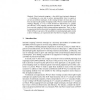Free Online Productivity Tools
i2Speak
i2Symbol
i2OCR
iTex2Img
iWeb2Print
iWeb2Shot
i2Type
iPdf2Split
iPdf2Merge
i2Bopomofo
i2Arabic
i2Style
i2Image
i2PDF
iLatex2Rtf
Sci2ools
SEMWEB
2004
Springer
2004
Springer
QOM - Quick Ontology Mapping
(Semi-)automatic mapping — also called (semi-)automatic alignment — of ontologies is a core task to achieve interoperability when two agents or services use different ontologies. In the existing literature, the focus has so far been on improving the quality of mapping results. We here consider QOM, Quick Ontology Mapping, as a way to trade off between effectiveness (i.e. quality) and efficiency of the mapping generation algorithms. We show that QOM has lower run-time complexity than existing prominent approaches. Then, we show in experiments that this theoretical investigation translates into practical benefits. While QOM gives up some of the possibilities for producing high-quality results in favor of efficiency, our experiments show that this loss of quality is marginal.
Related Content
| Added | 02 Jul 2010 |
| Updated | 02 Jul 2010 |
| Type | Conference |
| Year | 2004 |
| Where | SEMWEB |
| Authors | Marc Ehrig, Steffen Staab |
Comments (0)

